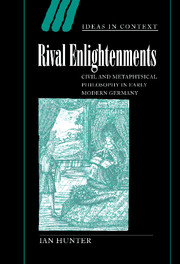Crossref Citations
This Book has been
cited by the following publications. This list is generated based on data provided by Crossref.
Haakonssen, Knud
2000.
The Cambridge History of Eighteenth-Century Philosophy.
BESCH, JANICE
and
MINSON, JEFFREY
2000.
Participatory Policy making, Ethics, and the Arts.
American Behavioral Scientist,
Vol. 43,
Issue. 9,
p.
1446.
Burchell, David
2001.
Multiculturalism and its Discontents.
Ethnicities,
Vol. 1,
Issue. 2,
p.
233.
Helliwell, Christine
and
Hindess, Barry
2002.
The Empire of Uniformity and the Government of Subject Peoples.
Cultural Values,
Vol. 6,
Issue. 1-2,
p.
139.
Hunter, Ian
and
Saunders, David
2002.
Natural Law and Civil Sovereignty.
p.
1.
Ahnert, Thomas
2002.
Natural Law and Civil Sovereignty.
p.
91.
Haakonssen, Knud
2002.
Natural Law and Civil Sovereignty.
p.
27.
Grunert, Frank
2002.
Natural Law and Civil Sovereignty.
p.
123.
Hunter, Ian
2003.
Early Modern Natural Law Theories.
p.
169.
donald, James
2003.
Kant, the press, and the public use of reason.
Javnost - The Public,
Vol. 10,
Issue. 2,
p.
45.
Ahnert, Thomas
2003.
Early Modern Natural Law Theories.
p.
257.
Cryle, Peter
and
O’Connell, Lisa
2003.
Libertine Enlightenment.
p.
1.
Kelly, Duncan
2004.
Revisiting the Rights of Man: Georg Jellinek on Rights and the State.
Law and History Review,
Vol. 22,
Issue. 3,
p.
493.
Fletcher 1, Paul
2004.
The political theology of the empire to come.
Cambridge Review of International Affairs,
Vol. 17,
Issue. 1,
p.
49.
Ferguson, Frances
2004.
On Getting Past Yes to Number One.
Critical Inquiry,
Vol. 30,
Issue. 2,
p.
369.
duGay, Paul
2005.
Which is the ‘Self’ in ‘Self-Interest’?.
The Sociological Review,
Vol. 53,
Issue. 3,
p.
391.
von Friedeburg, Robert
2005.
The Problems of Passions and of Love of the Fatherland in Protestant Thought: Melanchthon to Althusius, 1520s to 1620s.
Cultural and Social History,
Vol. 2,
Issue. 1,
p.
81.
La Vopa, Anthony J.
2005.
Thinking about Marriage: Kant’s Liberalism and the Peculiar Morality of Conjugal Union.
The Journal of Modern History,
Vol. 77,
Issue. 1,
p.
1.
di Giovanni, George
2005.
Freedom and Religion in Kant and his Immediate Successors.
Goldie, Mark
and
Wokler, Robert
2006.
The Cambridge History of Eighteenth-Century Political Thought.





